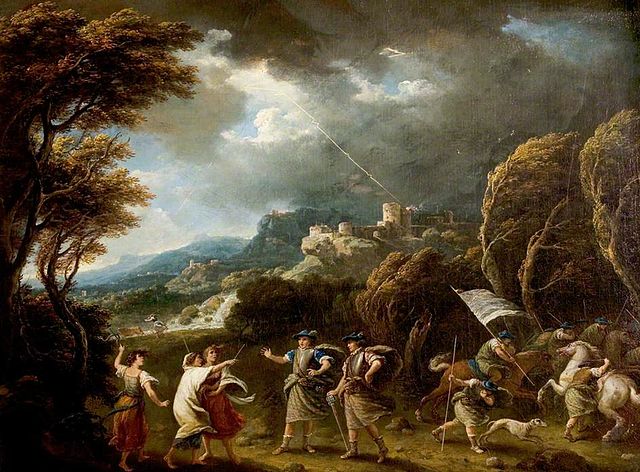DD asks: “Is there any truth to the belief that the play, Macbeth, was once cursed by a coven of witches, which is why there are so many accidents during productions of the play?”
Yes, that is the prevailing view, particularly among actors, many of whom decline to call the play by its name for fear of coming under the influence of the dreaded curse. Instead, they refer to it as “the Scottish play.” Others believe that the mere mention of the name of the play in a theater will cause bad luck (an obvious superstition).
According to the Royal Shakespeare Company (RSC), the origin of this superstition began with a coven of witches who cursed the play for all eternity in revenge for Shakespeare’s inclusion of spoken spells, which were supposedly real, even down to their bizarre ingredients of “fenny snake, eye of newt, and toe of frog.”
At the time of the play’s creation in 1606, England was under the rule of King James I of England who was well-known for his fear of witchcraft. It is said that Christopher Marlowe’s Doctor Faustus, which was published in 1604 and dealt with witchcraft’s association with the devil, was written to appease the King.
A year later, Shakespeare came out with Macbeth which opens with the three witches making a prophecy that he would become King. The witches appear at various points throughout the play and utter their incantations.
As the Telegraph reports in this article, King James promptly banned the play for five years because he was “no fan of its supernatural incantations.”
According to lore, however, that was the least of the play’s problems.
“Legend has it the play’s first performance (around 1606) was riddled with disaster,” the RSC reports. “The actor playing Lady Macbeth died suddenly, so Shakespeare himself had to take on the part. Other rumored mishaps include real daggers being used in place of stage props for the murder of King Duncan (resulting in the actor’s death).”
This was just the beginning of the misfortunes associated with the play. In 1849, a riot between followers of two rival versions of the play left 20 people dead and more than 100 injured.
“Other productions have been plagued with accidents, including actors falling off the stage, mysterious deaths, and even narrow misses by falling stage weights, as happened to Laurence Olivier at the Old Vic in 1937,” the RSC reports.
“For actors in particular, the very popularity of the play itself can be doom-laden,” The Telegraph reports. “Traditionally, theater owners would replace struggling productions with Macbeth, a proven box-office draw. Actors in any other play feared any mention of Macbeth because it usually spelled the end of their present job.”
In this 1988 Washington Post story, a host of other tragedies and mishaps are attributed to the curse, such as the death of three actors in a 1942 production, one of whom died on stage.
In the 1950s, a performance in Bermuda nearly killed everyone in the theater when the flames around Macbeth’s castle burned out of control.
ScotlandNow.com reports that “When Charlton Heston took the lead in 1953 he suffered a motorcycle crash during rehearsals and his legs were left horrifically burned during a performance - it emerged his tights had been mysteriously soaked in kerosene.”
Although curses are very real, and can be very destructive, there are other explanations, such as how the play is full of action scenes and special effects that make mishaps more likely.
There is also the influence of superstition on the actors who may attribute typical on-stage mishaps to the curse, or even cause some of these mishaps in their attempts to avoid bad luck.
The bottom line is that if there is a curse on the play, I can find no record of anyone trying to break it – which is entirely possible through the power of Jesus Christ.
Until that happens, it will remain what it is today – a mystery shrouded in superstition.
© All Rights Reserved, Living His Life Abundantly®/Women of Grace® http://www.womenofgrace.com

